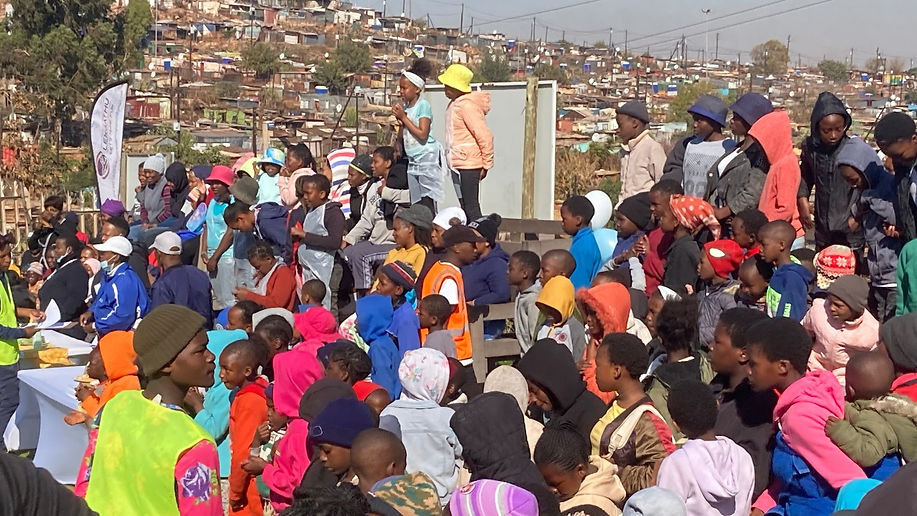
Why Munsieville?
The community expects!
Successive generations for over a century have waited expectantly for transformation and hope. Munsieville is believed to be the oldest undeveloped township in South Africa. Largely unknown beyond its immediate area, it played a pivotal role in the struggle against apartheid and was the childhood home of the late Nobel laureate, Archbishop Desmond Tutu; a place that is said to have influenced the concept of “The Rainbow Nation”.

Anette von Block and Paul Brooks discuss mission in Munsieville with the late Archbishop Desmond Tutu
But, despite being a stone’s throw from the richest square mile on the African continent, Munsieville is poor, with the majority of its residents living in grinding poverty, with children raised in tiny tin shacks with no sanitation, running water or power. Gender-based violence, child abuse and neglect are endemic, and to make matters worse, up to two-thirds of residents are not even counted in official statistics – resulting in grossly inadequate services being provided by the state. A census in 2011, two years after leaders of Root and Branch Change started working in Munsieville*, stated that 19,128 people lived there, but an independent home-to-home survey, supported by a major American university using GPS tracking technology, counted over 55,500 people – including 16,000 children!
But Munsieville is not voiceless. The community is vibrant, resilient and increasingly organised. Their problem is that their voice, like people in poverty worldwide, is not being listened to by those in authority.
So, after a century of being stigmatised and marginalised as a “native workers settlement”, is there hope?
The answer is a resounding YES!
Firstly, almost unnoticed over the last decade, a network of highly committed organisations has emerged, dedicated to serving the poor through bold action that is transforming the way children and families receive vital health, social and educational services – not replacing the need for statutory service provision, but recognising that when someone is in crisis, letters to absent politicians are simply not enough.

Secondly, many of Munsieville’s churches are recognising that although they are part of the greatest force for transformation in the township, they will only be effective when they mobilise, stepping out of their faith communities to be the Body of Christ amongst hurting people searching for hope. Root and Branch Change is particularly committed to supporting this mobilisation of the churches of Munsieville and their brothers and sisters around the world.
Thirdly, increasingly, the residents of Munsieville are moving away from the paralysing despair that has long neutralised their capacity to both demand a better life and to dedicate their energy to make it happen. The spirit that once galvanised them in the cause of freedom from oppression under the apartheid regime is emerging once more, in the struggle for a future for their children and freedom from poverty.
Although our work is currently concentrated on the people of this small community, our vision is for children in poverty across the whole of South Africa. To us, every “win” in Munsieville is a victory for children everywhere, because this township has a track record in boxing above its weight to achieve great things. Munsieville is strategic!
*Paul Brooks, our Executive Chairman started working in Munsieville in 2009 when he was Executive Director of NGO Project HOPE UK, and co-founder of The Thoughtful Path: Munsieville
